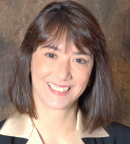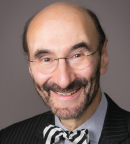
Monica M. Bertagnolli, MD Brigham and Women's Hospital and Dana-Farber Cancer Institute, Boston, Massachusetts

Bruce D. Minsky, MD The University of Texas MD Anderson Cancer Center , Houston, Texas
ASCO Connection: Why do you want to serve as ASCO President?
Monica Bertagnolli: Serving as ASCO President is a tremendous personal honor for anyone in the field of oncology. Much more importantly, it is an opportunity to make a meaningful difference by providing a strong voice in the health-care community and political process for colleagues whom I consider to be my particular constituency: clinical and translational researchers, community oncologists participating in clinical research, and surgical oncologists. Finally, I greatly enjoyed and valued my time serving on the ASCO Board of Directors and welcome the opportunity to work with this leadership team again to craft the strategies for ASCO’s success as a professional organization.
Bruce Minsky: ASCO is the premier cancer society in the world and provides leadership in clinical care, research, quality and safety, medical economics, and advocacy. The opportunity to lead an organization of such breadth and depth would be a great honor. I can think of no better way to serve the profession of oncology.
AC: Discuss three key issues that ASCO and the oncology field are currently facing and how you wish to make an impact on these issues as ASCO President.
MB: 1) Health-care reform, in particular the advent of integrated practice groups, bundled payment structures, or any other requirement that will mandate even closer collaboration between all cancer disciplines. As a cancer surgeon and career-long contributor to both multidisciplinary clinical care and multidisciplinary research, I am eager to see this transition conducted in a way that will bring benefit to patients, providers, and society. ASCO can have a major role in bringing this about.
2) Public-private partnership to enable cancer clinical and translational research. In the cooperative group setting, collaboration among industry, government, and academia is the only way to achieve rapid and meaningful advancements in research that directly impact patient care. The opportunity for me to speak to this issue as ASCO President brings great synergy.
3) Data-sharing initiatives. We are finally developing policies that make data-sharing a standard, rather than an exception. This has come from converging imperatives, such as a requirement for data from multiple data sources to answer questions; pioneering work by ASCO and Project Data Sphere®, which delivers platforms and policies to enable data-sharing; and, most recently, the halo effect of the White House’s Cancer Moonshot Initiative.
BM: 1) Payment reform. 2018 to 2019 will be a defining point as to how we oncologists are incentivized and reimbursed for our clinical practice. With the movement toward a value-based capitated model, we will need to provide a rational, fair, and transparent vision for our profession.
2) Clinical research. Advances in clinical outcomes ensure our continued success. ASCO must and will continue to be the showcase for these breakthroughs. Our membership values it, and our patients deserve it.
3) Mentorship. Our young members are the future of ASCO. We must recognize, nurture, and provide them with opportunities to develop into future leaders.
AC: What specific skills and attributes do you bring to this position that make you a strong candidate for President of ASCO?
MB: My most relevant experience is as group Chair of Alliance, representing its members, with main member institutions including 53 academic medical centers and 75 community oncology networks. Working with these exceptional oncology professionals has been an incredibly inspiring experience. In this role, I am aware of the challenges of clinical care, clinical research, and career development for all fields of oncology. As a result, I am qualified to represent a very broad range of cancer professionals. I have also served for 5 years on the Institute of Medicine’s National Cancer Policy Forum, and this has given me a solid understanding of important issues requiring better alignment between scientific and clinical need and national health policy development.
BM: I have been fortunate to serve in leadership roles in oncology societies and multidisciplinary committees. Those that most help me meet the challenges of the ASCO presidency include the American Society for Radiation Oncology presidency and Chair of the Board, Co-Chair of the National Cancer Institute Gastrointestinal Steering Committee, Director of Clinical Research for the MD Anderson Division of Radiation Oncology, and the Associate Dean/Chief Quality Officer at the University of Chicago Medical Center. With these valuable opportunities, I have acquired organizational, managerial, fiscal, and diplomatic skills.
AC: Name three areas of opportunities, growth, and/or change to enhance ASCO’s mission.
MB: ASCO is on the right track with its innovative work in health care information technology, developing new clinical cancer research models and tools (CancerLinQ™ and TAPUR), promoting high-quality care (QOPI®), and engaging the next generation (Leadership Development Program). All of these areas need to be continued and strengthened. Three opportunities I would specifically focus upon are: 1) linking academic and community oncologists together in programs that seek solutions for issues in health-care delivery and cancer research; 2) enabling the goal of precision medicine through broadly collaborative clinical trials that merge translational and clinical endpoints; and 3) expanding programs to train the next generation to effectively lead multidisciplinary initiatives, which means programs that deliver more junior surgeons, pathologists, radiation oncologists, and imaging researchers who are invested in ASCO programs.
BM: 1) Membership. We need to continuously expand our membership base—both geographically (international members) and multidisciplinary (other oncology specialties). ASCO will be in an even stronger position to influence oncology care as the authoritative source for cancer practice. 2) Safety/quality. CancerLinQ™ is a great first step in positioning ASCO to proactively identify metrics and help our membership comply and improve. As data become available, they need to be quickly analyzed and disseminated to show the value of the Society’s investment. 3) Patient advocacy. The positive influence of our patient advocates cannot be underestimated. Their remarkable efforts have resulted in a substantial increase in funds for cancer research. ASCO needs to continue to support these relationships and provide them with a public platform.
AC: What do you see as the future of ASCO and the field of cancer research and care in the next 5 and 10 years? What is the most important role for the Society in shaping the global oncology community within the next 10 years?
MB: I anticipate that most of all of the fields involved in cancer care will be joined financially as never before, making integrated cross-disciplinary operations mandatory throughout the cancer care spectrum. ASCO should be a leader in developing and promoting policies that maximize benefits to patients and providers during this transition. In research, the clinical and translational fields will continue to broaden to encompass outcomes enabled by electronic health record technology, patient-reported outcomes, and other new avenues of identifying value to patients as opposed to more traditional determinants of therapeutic success. We will also be challenged by a wealth of individual patient data resulting from data-intensive technologies and a high expectation on the part of providers and patients that precision cancer medicine delivers superior results. In the face of all this, ASCO will need to be a strong voice separating hype from true value by demanding data quality, significant clinical impact, and advances in understanding the biologic basis of disease.
BM: Although there are challenges, the future is bright. The terrific discoveries in systemic therapy, especially targeted agents and the identification of molecular markers to help predict responses, will continue to fuel advances in cancer research and therapy. Given its multidisciplinary membership, ASCO is clearly the most influential society. Through its meetings, advocacy, and global reach, it can disseminate these advances and provide guidance to oncologists, policymakers, payers, and patients. ■
Originally printed in ASCO Connection. © American Society of Clinical Oncology.
“Interviews with President-Elect Candidates.” ASCO Connection, October 2016. All rights reserved.

